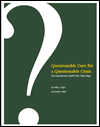Human Events, January 25, 2008
Scripps Howard News Service, January 25, 2008
With Mike Huckabee down and Fred Thompson out in Florida, Tuesday’s Sunshine State primary promises a three-way brawl among Rudolph W. Giuliani, John McCain, and Willard Mitt Romney. Voters there, and beyond, should regard these three candidates like lamps in a traffic signal.
*Romney is the red light. The former Massachusetts governor’s tax-and- spend record should stop Republican voters in their tracks. Romney presents himself as a corporate super-mechanic who can lift the hood and make a stalled sedan NASCAR-ready. Too bad Romney left his state in the repair bay after four years of parts and labor.
Rather than reinvigorate Massachusetts with broad-based tax relief — as did his Republican gubernatorial predecessors, William Weld and Paul Cellucci — Romney launched a tax-hike binge reminiscent of Daddy Bush’s 1990 “read my lips” raid on America’s wallets.
Romney enacted 126 brand-new or increased fees, having requested 70, totaling $473 million. Thus, Massachusetts residents pay more for marriage licenses, gun registrations, blindness certificates, home-deed registries, power-meter inspections, and even milk-dealer permits. Romney also signed 19 tax increases worth $519 million. Romney taxed gasoline, corporate trusts, non-profit organizations, online software, sales catalogs, securities companies, and more.
Romney also saddled Massachusetts with a government-run health-insurance scheme. Those who have ignored its individual-coverage mandate now face $219 in tax penalties, which could soar this year to $912. The Pacific Research Institute’s Sally Pipes calculates that RomneyCare cost taxpayers $619 million in 2007 — 31 percent above projections.
All this bought economic stasis. Manufacturing employment fell 14 percent under Romney, twice the national figure, ranking Massachusetts 48th among the states. As Romney left office, 124,100 fewer employees were working, versus February 2001, before Massachusetts entered recession. As Romney spokesman Eric Fehrnstrom has admitted: “Did we recover all the jobs that were lost? No.”
*This race’s yellow light is John McCain. Call him “Bob Dole 2.0” — a beloved war hero and veteran Beltway insider with an uneven tax record. The Arizona senator voted to extend President Bush’s tax cuts and now wants them permanent. Yet, he rejected them in 2001 and 2003. According to Senate records McCain cast 52 substantive and procedural votes for higher taxes. He backed Internet-access taxes, the Death Tax, a surtax on incomes above $1 million, and $755.67 billion in tobacco taxes. He also spurned lower taxes on incomes and capital gains, and repeatedly voted to delay and shrivel other tax cuts.
On spending, however, McCain is delightfully parsimonious. He fought 2003’s $558 billion Medicare drug entitlement and is one of Congress’ loudest voices against extravagant, idiotic federal boondoggles.
*The green light is Giuliani. New York’s former mayor is a stalwart fiscal conservative who recently proposed America’s largest tax cut — ever.
As mayor, Giuliani pitched 64 tax cuts, and then charmed, scared, or otherwise persuaded an overwhelmingly Democrat City Council to enact 23 of them totaling $9.8 billion. The top tax rate dropped 20.6 percent (vs. Romney’s 0 percent reduction). Also, the overall tax burden (tax revenue’s share of personal income) fell 17.1 percent under Giuliani, while it rose 10.8 percent under Romney.
On Giuliani’s watch, real, per-capita spending declined 0.9 percent. He shrank Gotham’s government and produced a $2.9 billion budget surplus, largely through spending reductions and higher revenues generated by accelerated economic growth that his tax cuts triggered.
Likewise, Giuliani unleashed an employment machine. He helped private-sector payrolls soar 15.2 percent (vs. Romney’s 0.5 percent) — great news for 411,600 job seekers. Moving 58 percent of public-assistance recipients from welfare to work also benefited taxpayers. More important, this strengthened the character of the 643,348 people who underwent this transformation.
Giuliani’s proposed, optional, one-page tax return collapses today’s six rates (up to 35 percent) into three: 10, 15, and 30 percent. This significantly would lower everyone’s taxes. A family of four earning $80,000 would enjoy a 24 percent tax cut of $2,207. Single Americans making $35,000 would save 13 percent on their taxes.
Giuliani also would index and eventually excise the Alternative Minimum Tax and electrify the economy by chopping corporate taxes from 35 to 25 percent, and capital gains taxes from 15 to 10 percent.
How swiftly will America travel the road ahead? GOP voters will help decide — by lighting that path red, yellow, or green.
Mr. Murdock, a New York-based commentator to HUMAN EVENTS, is a columnist with the Scripps Howard News Service and a media fellow with the Hoover Institution on War, Revolution and Peace at Stanford University.

